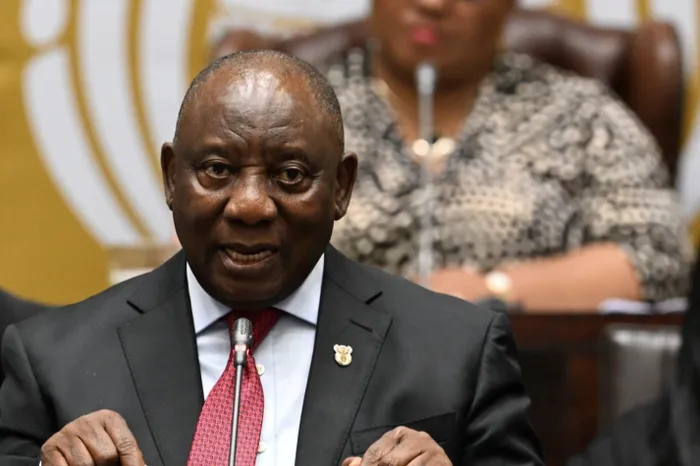Ramaphosa refutes NPA political interference claims and supports Kubayi's appointment

President Cyril Ramaphosa answered questions in Parliament on Thursday, saying there is no political interference within the NPA.
Image: X/GCIS
President Cyril Ramaphosa on Thursday denied any knowledge of complaints from current National Director of Public Prosecutions (NDPP) Shamila Batohi regarding political interference within the National Prosecuting Authority (NPA).
Ramaphosa made these assertions during a question-and-answer session in Parliament, where he also defended the appointment of the Minister of Justice and Constitutional Affairs, Mmamoloko Kubayi, an ANC member, to chair the panel tasked with recommending the next NDPP.
The issue of political interference in the NPA was brought to the fore by Wesley Douglas of the uMkhonto weSizwe Party (MK Party).
Douglas referenced recent complaints attributed to the NDPP and directly questioned Ramaphosa on whether these concerns had been raised with him.
“The NDPP recently complained that there is a problem and there is political interference in the prosecuting authorities. Has this been raised with the president, and what are the concerns that were raised?” Douglas probed.
He further pressed the president, asking: “Has the NDPP approached to explain her fears? And have you, Mr President, interfered in any prosecution decisions? Are you confident that you will not be contradicted on this matter now or in the future?”
In his response, Ramaphosa denied any knowledge of this.
“I have not heard the NDPP complain about political interference, and I do not interfere in prosecution matters,” he said.
He reiterated his long-held position on the separation of powers, emphasising the independence of institutions tasked with upholding the rule of law.
“I have made it very clear in this House that as president, I'm not prepared to act as a prosecutor, a policeman, a judge, or any of those because we have people who have been appointed to execute these tasks.
“My role is to make sure that those people are appointed and do their work in terms of our laws and in terms of our Constitution without any interference,” he said.
Ramaphosa acknowledged the potential for temptation to get involved in such matters, but insisted on adhering to the principles of judicial independence.
“There may be the possibility that there is a temptation to get involved, but I've always guided against that. I should not because the rule of law requires that. Institutions should operate independently without any fear, favour, or prejudice.”
The parliamentary session also saw Ramaphosa defending his decision to appoint Minister Kubayi as the chairperson of the panel responsible for recommending the next NDPP, following the current NDPP's retirement in January.
This decision was questioned by Mmusi Maimane of Build One South Africa (Bosa), who highlighted the ANC’s historical challenges and the ongoing investigations into the party.
Maimane referenced Ramaphosa's own admission at the Zondo Commission that the ANC stands as “accused number one” and the current Madlanga Commission’s investigation into the party.
He then directly challenged the appointment: “Would it not be prudent that the person who chairs the panel that you set up be someone from the ANC, perhaps someone from the GNU partner, in order to avoid potential conflict of interest so that the person appointed is able to prosecute ANC leaders in the future should they be implicated?”
Ramaphosa dismissed the notion that political affiliation should be a determinant in such a critical appointment.
“The appointment of key officials such as the NDPP has nothing to do with being party political. Has nothing to do with whether one is a member of the ANC or any other party,” he said.
He elaborated on the rationale behind his choice, highlighting Kubayi’s professional standing and integrity.
“The chairperson of the panel is the Minister of Justice and Constitutional Affairs. I gave quite a lot of thought to this and ended up deciding because the minister is the one who works with judges, prosecutors, magistrates, and all of them vouch for not only that position as neutral, but all of them vouch for the minister because of her integrity and her ability to do the work.”
Ramaphosa expressed his full confidence in Kubayi’s ability to lead the panel impartially.
“That gave me confidence that I have a minister in Minister Kubayi, who will be able to work with the panel without being conflicted or dominating the panel.”
He further assured Parliament that the appointed panellists were individuals of high integrity who would not be swayed or marginalised.
“The panellists I've appointed are people of great integrity and great eminence, and they are not about to be marginalised or dominated or to be led into conflictual decisions. So whatever decision that will come out from the panel will be the decision of the panel. I'm sure about that.”
The questions from MK Party and Bosa were supplementary questions after the DA’s Glynis Breytenbach questioned the criteria used for appointing the panel, to which Ramaphosa explained that while the Constitution empowers the president to appoint the NDPP without specific criteria, he chose to constitute a panel for transparency and public confidence.
He detailed the diverse skills and experiences sought in panel members, including public service administration, financial management, legal and jurisprudence, and the administration of justice. He also highlighted the inclusion of representatives from Chapter 9 institutions and legal bodies, emphasising their independence and impartiality.
mashudu.sadike@inl.co.za
Related Topics: